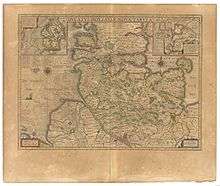Brunsbüttel
| Brunsbüttel | ||
|---|---|---|
|
Town hall in Brunsbüttel | ||
| ||
 Brunsbüttel | ||
Location of Brunsbüttel within Dithmarschen district | ||
| Coordinates: 53°53′47″N 09°08′19″E / 53.89639°N 9.13861°ECoordinates: 53°53′47″N 09°08′19″E / 53.89639°N 9.13861°E | ||
| Country | Germany | |
| State | Schleswig-Holstein | |
| District | Dithmarschen | |
| Government | ||
| • Mayor | Wilfried Hansen | |
| Area | ||
| • Total | 65.24 km2 (25.19 sq mi) | |
| Elevation | 1 m (3 ft) | |
| Population (2015-12-31)[1] | ||
| • Total | 12,740 | |
| • Density | 200/km2 (510/sq mi) | |
| Time zone | CET/CEST (UTC+1/+2) | |
| Postal codes | 25534–25541 | |
| Dialling codes | 04851, 04852, 04855 | |
| Vehicle registration | HEI | |
| Website | www.brunsbuettel.de | |
Brunsbüttel (![]() German pronunciation ) is a town in the district of Dithmarschen, in Schleswig-Holstein, northern Germany that lies on the mouth of the Elbe river, near the North Sea. It is the location of the western entrance to the Kiel Canal, the busiest artificial waterway in the world.
German pronunciation ) is a town in the district of Dithmarschen, in Schleswig-Holstein, northern Germany that lies on the mouth of the Elbe river, near the North Sea. It is the location of the western entrance to the Kiel Canal, the busiest artificial waterway in the world.
History
The earliest reference to the town is in a document dated 14 July 1286.



With the construction of the Kiel Canal (Nord-Ostsee-Kanal) in 1911, the town was divided in two.
During the opening days of World War II, on 4 September 1939, the No. 149 Squadron RAF carried out the second bombing of that war, targetting warships near the town.[2]
Economy
Brunsbüttel became an industrial area in the 1960s and 1970s. The ChemCoast Park Brunsbüttel is still the most important enterprise zone and with 2,000 ha also the largest industrial area in Schleswig-Holstein.
Chemical Plants
Energy
- Vattenfall: Gas Turbine Power Station (near the Brunsbüttel Nuclear Power Plant which is out of service)
Harbours
- Brunsbüttel Ports GmbH (port operation and logistics)
Notable residents
- Jennifer Oeser (born 1983), athlete
- Karen Duve author
References
| Wikisource has the text of the 1911 Encyclopædia Britannica article Brunsbüttel. |
| Wikimedia Commons has media related to Brunsbüttel, Germany. |

